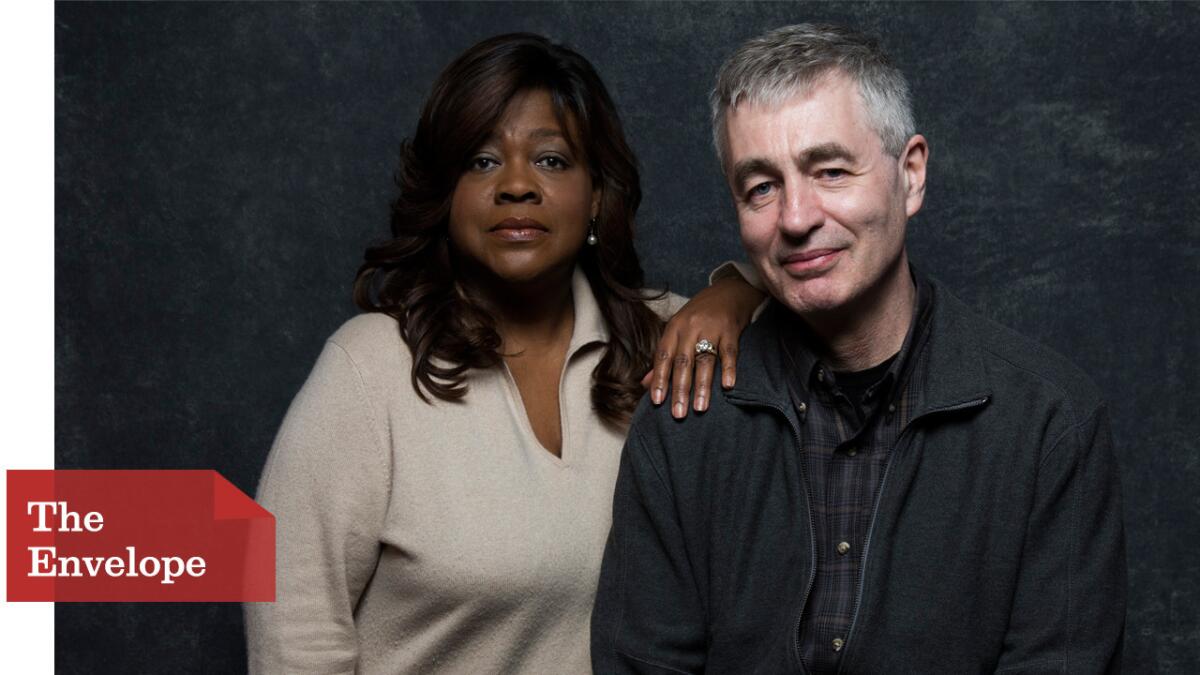The Envelope: An eye on the unconventional: ‘Life Itself,’ ‘Citizenfour’

- Share via
Getting rabid Chicago Bulls fan Gene Siskel to see “Hoop Dreams” was easy enough, but talking fellow film critic Roger Ebert into slotting a three-hour sports-focused documentary into his Sundance schedule was no mean feat.
“Roger,” the veteran Chicago publicist working the film told him, “it’s not about basketball.”
If Ebert had been at Sundance last January, 20 years after he became the most ardent champion of “Hoop Dreams,” the best way to persuade him to see “Life Itself” might have been to tell him, “It’s not about film criticism.”
The documentary is Ebert’s story — from his work as a young critic at the Chicago Sun-Times, through his groundbreaking television partnership with Siskel, his rival at the Chicago Tribune and, finally, his cancer treatments, the removal of his jaw and his death in 2013.
“Roger wasn’t the most insightful critic, and he wasn’t the greatest stylist,” says “Life Itself” director Steve James, “but he combined this great Midwestern humility with clarity, and he had a way of connecting movies to the world at large.”
James, who also directed 1994’s “Hoop Dreams,” says Ebert, “more than any single person, had the greatest impact on my career.” But he didn’t agree to direct a documentary based on Ebert’s bestselling memoir out of gratitude. What got him interested was the way Ebert’s storied career— he was the first and, for decades, the only person to win a Pulitzer Prize for film criticism — was only a small part of the book, equivalent to but not more important than his struggle with alcoholism or the long, bumpy road leading to his marriage to Chaz Ebert, who now manages the empire built on Robert Ebert’s name.
James, whose observational documentaries usually take years to shoot, thought he’d be doing something easier, more conventional with “Life Itself.” But when Ebert was hospitalized shortly after filming began, James found himself once again shadowing his subject with a camera, capturing the exceptional fortitude and good humor with which Ebert battled the cancer that would eventually take his life.
“I was really struck by how courageous he was in the face of everything, his spirit,” James says. “And I was struck by how funny he could be, despite being unable to speak.”
Humor isn’t a quality one generally associates with another figure who has captured the public’s attention in recent years: Edward Snowden, the former National Security Agency contractor who revealed that the U.S. government was collecting mind-boggling amounts of data on its citizens.
But the Snowden who emerges in Laura Poitras’ “Citizenfour,” which by most reckonings is “Life Itself’s” major competition in the documentary Oscar race, is a softer-edged figure than the one who has spent the last year and a half ringing alarm bells about threats to individual privacy. We’ve seen him before, first in the video Poitras shot in a Hong Kong hotel room as part of the reporting for which she would share the 2014 Public Service Pulitzer. But the portrait of Snowden in that 12-minute clip is only a small part of the man we see in “Citizenfour,” who can be funny or peevish, boldly forthright one moment and anxiously paranoid the next.
Some critics have complained that “Citizenfour” adds little to the articles Poitras coauthored in the Guardian and the Washington Post, but “Citizenfour” still has a few bombshells, such as the disclosure that the U.S. government has more than a million people on its various watch lists. And even those who’ve seen that story — published on the Intercept, the site Poitras runs with Glenn Greenwald and Jeremy Scahill — might reel from Snowden’s unprintable reaction. Imagine what it takes to blow Snowden’s mind.
Although Snowden instructed Poitras and Greenwald to “paint a target on my back” so that none of his colleagues would fall under government suspicion, “Citizenfour” has wider aims. It’s a movie about one man, the system he was once a part of and what Poitras calls “the moral drift away from the rule of law.” It’s not about basketball.
More to Read
Sign up for The Envelope
Get exclusive awards season news, in-depth interviews and columnist Glenn Whipp’s must-read analysis straight to your inbox.
You may occasionally receive promotional content from the Los Angeles Times.






